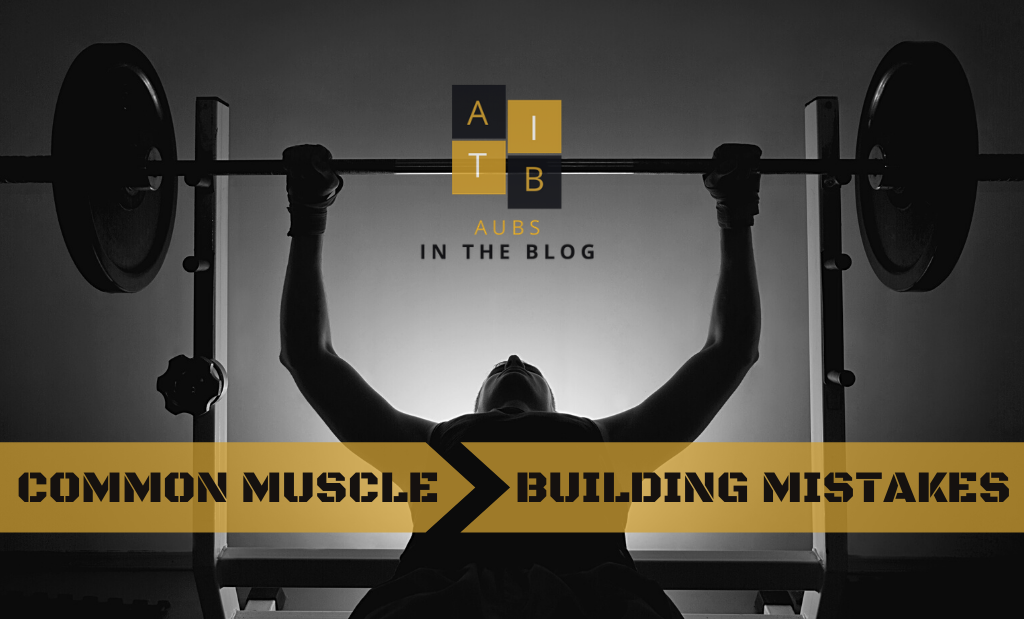
I’ve been a fitness professional since 2016. With so much accessible information about exercise and nutrition, it can be challenging to separate the most important focal points. I’ve combined my experience as a fitness and nutrition coach with evidentiary results to share this exclusive Aubs In The Blog on common muscle building mistakes
ALWAYS TRAINING TO FAILURE
If you train to failure every time you workout, you are jeopardizing your max output and performance potentials. By burning yourself down, you diminish your strength and energy at the start of each new set. Research supports that there is a time and place for implementing failure into your programming and workouts for muscle building, and it’s extremely important to limit failure training (i.e., forced reps, drop sets, missing your final rep, or neglecting proper form to hit your last rep, etc.) for a few different reasons.
First, training to failure doesn’t carry many benefits for hypertrophy when using heavy loads to make maximum strength gains. This is basic muscle-building science. Hypertrophic training relies on increasing motor unit recruitment, and motor unit recruitment is already full when using heavy loads. This also produces more muscular damage compared to non-failure training (and that doesn’t always mean more lean mass growth).
Second, the reps happening before the final few you have to grind out are equally as important. These reps are responsible for increasing neural activation and fatigue the muscle fibers. When looking at the big picture, compound lifts i.e. squats, bench press, bent-over rows, recruit more than one major muscle group. When working to failure you are actually shortchanging yourself because not all the muscles involved in the movement hit failure at the same time.
Third, training to failure creates high neural stress. This is the body’s method of reacting to conditions that present similar to threats, challenges, and physical or psychological barriers. An increased neural stress level can cause decreased performance output.
PRIORITIZING REST AND RECOVERY FOR MUSCLE BUILDING
Proper rest and recovery promote an increased sense of well-being by helping the body to decrease cortisol in your system and balance hormone levels related to metabolism and appetite. The Sleep Matters Club has performed a number of studies examining what goes on during a full eight hours of rest and the influence it has on the body, here’s what they’ve found…
 STAGE ONE: DOZING OFF BUT EASILY WOKEN
STAGE ONE: DOZING OFF BUT EASILY WOKEN
Brain-wave patterns during this stage are associated with muscle memory and movements learned throughout the day.
STAGE TWO: LIGHT SLEEP
Brain activity slows down as the body relaxes in preparation for deep sleep. Production of Human Growth Hormone (HGH) begins.
STAGE THREE: DEEP & RESTORATIVE SLEEP
Blood supply to the muscles increases and more HGH is released. This enables muscles to recover and re-energize while improving immune function and metabolism. The most growth and repair happens during this stage—the body even releases the anti-inflammatory hormone prolactin, which aids joint recovery!
STAGE FOUR: REM PHASE
Brain activity starts up again and dreaming occurs. During this stage, muscles are supplied with extra oxygen to breakdown lactic acid and minor muscle tears are repaired.
The next time you find yourself assessing your progress and habits, instead of looking at what you are doing evaluate the things that you are not. Start with logging your sleep patterns. This will give you a better idea of how much rest you average on a nightly basis and where you can improve.
SKIPPING MEALS IS A RED FLAG MISTAKE
 Skipping meals is one of the most physically adverse choices you can make when trying to build and maintain lean muscle mass. The main fuel for the brain is glucose. This is the simple sugar form of carbohydrates. Both the brain and body rely on receiving glucose in order to maintain a healthy blood sugar level and support the body during energy demands. Any time these levels drop there is an interruption in our ability to think straight and focus.
Skipping meals is one of the most physically adverse choices you can make when trying to build and maintain lean muscle mass. The main fuel for the brain is glucose. This is the simple sugar form of carbohydrates. Both the brain and body rely on receiving glucose in order to maintain a healthy blood sugar level and support the body during energy demands. Any time these levels drop there is an interruption in our ability to think straight and focus.
Low blood sugar is also known for causing irritability and fatigue. These feelings can create additional stress on the body and result in the production of cortisol. Cortisol is a stress-response hormone that can be catabolic in nature.
Even more importantly, skipping meals means you aren’t receiving adequate protein in your diet. This macronutrient is responsible for:
- Building and repairing tissues such as muscle, bone, cartilage, and skin
- Producing important enzymes, hormones, and body chemicals
- Turning on important metabolic functions and actions
Protein also supports satiety! This building block has the ability to reduce levels of the hunger hormone ghrelin while boosting the levels of peptide YY, a hormone that makes you feel full.
Finally, protein when consumed at the proper amount to reach the full leucine threshold of 2.5 grams, activates muscle protein synthesis (MPS). This is a four-hour window that the body enters where it is in a peak state to improve lean muscle. If there is a common pattern of skipping meals or going long durations between eating, the body will accumulate more hours in muscle protein breakdown (MPB). The ratio of MPS to MPB determines whether your body is optimally building or breaking down lean muscle mass.

